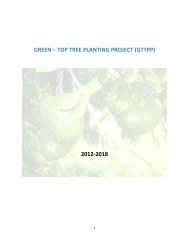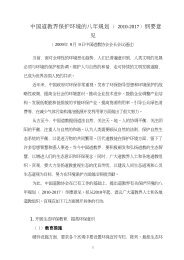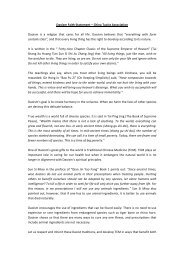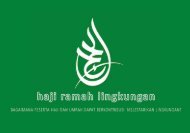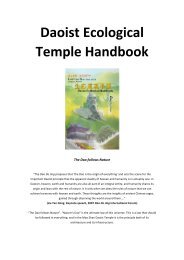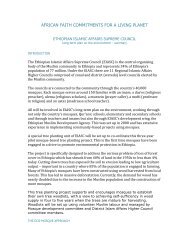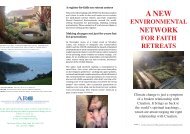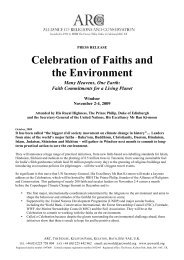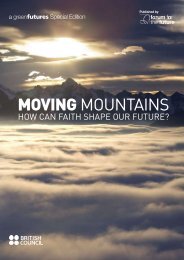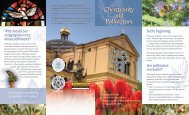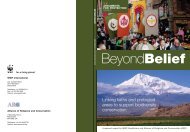summary paper - Alliance of Religions and Conservation
summary paper - Alliance of Religions and Conservation
summary paper - Alliance of Religions and Conservation
Create successful ePaper yourself
Turn your PDF publications into a flip-book with our unique Google optimized e-Paper software.
Religious language contains much <strong>of</strong> the wisdom which has been refined through a dialogue on the<br />
deeper questions <strong>of</strong> humankind over the centuries. Religious insight can lead to an underst<strong>and</strong>ing <strong>of</strong> the<br />
human condition which can be readily recognized <strong>and</strong> understood even by the nonbeliever.<br />
Using religious language in speaking about the human situation is not a question <strong>of</strong> imposing religious<br />
belief on anyone. Neither, however, should discussion <strong>of</strong> the human condition in a modern pluralist<br />
society disenfranchise the believer from bringing his or her specific contribution to social <strong>and</strong><br />
environmental reflection, springing from a mediation <strong>of</strong> religious concepts to the challenges <strong>of</strong> the world in<br />
which we live.<br />
One principle <strong>of</strong> Catholic social teaching which is particularly interesting here is called the universal<br />
destination <strong>of</strong> the goods <strong>of</strong> creation. The Second Vatican Council put it this way: “God intended the earth<br />
<strong>and</strong> all it contains for the use <strong>of</strong> all persons <strong>and</strong> all peoples, so that created goods should flow fairly to all,<br />
regulated by justice <strong>and</strong> accompanied by charity”. The Compendium notes that “as regards the<br />
ecological question, the social doctrine <strong>of</strong> the Church reminds us that the goods <strong>of</strong> the earth were created<br />
by God to be wisely used by all. They must be shared equitably, in accordance with justice <strong>and</strong> charity”.<br />
The Catholic Church has always spoken <strong>of</strong> respect for private property but it has never elevated private<br />
property to the rank <strong>of</strong> an absolute principle. All possession brings with it social responsibility, a “social<br />
mortgage”, which conditions which behaviour is to be judged moral <strong>and</strong> which immoral. Traditionally this<br />
principle was applied to questions <strong>of</strong> ownership <strong>of</strong> l<strong>and</strong> <strong>and</strong> natural resources.<br />
Today one would apply this principle also in a qualitative manner. It is not just about a just distribution <strong>of</strong><br />
the goods <strong>of</strong> the earth in a measurable way, but also about the qualitative dimensions <strong>of</strong> such distribution.<br />
We have the responsibility to use the resources <strong>of</strong> creation, human <strong>and</strong> environmental, in such a way as<br />
to enhance the overall integrity <strong>of</strong> all <strong>of</strong> creation. Development is about specific quantifiable goals, but it<br />
is above all about producing harmony <strong>and</strong> integrity. No one aspect <strong>of</strong> development should have priority,<br />
leaving the other totally aside. That is why in developmental policy we must strongly reaffirm that the fight<br />
against poverty <strong>and</strong> the fight for the protection <strong>of</strong> the environment must go h<strong>and</strong> in h<strong>and</strong>.<br />
Today therefore we would also have to say that there is an “ecological mortgage” on all private property,<br />
physical <strong>and</strong> intellectual, <strong>and</strong> thus on all economic development. This has been expressed in a slightly<br />
different way for example by Klaus Töpfer when he said, in the context <strong>of</strong> Germany, that we need to add<br />
an ecological dimension to the idea <strong>of</strong> social market economy.<br />
The way we may use the goods <strong>of</strong> creation should be conditioned by the effects that our behaviour has<br />
on the environment. This is not an optional extra for use on the occasions in which it can suit us. It<br />
belongs to an integral underst<strong>and</strong>ing <strong>of</strong> the relationship between the individual person, the human family<br />
<strong>and</strong> the environment which is both our nurture <strong>and</strong> our home.<br />
The universal destination <strong>of</strong> the goods <strong>of</strong> creation must also apply to equitable access to the decision<br />
making processes which concern the future. The more imbalances emerge among States in the<br />
international system, the more even valid international norms become lopsided in their application, with<br />
the result that the family <strong>of</strong> nations becomes a dysfunctional family. Development policy must enhance<br />
capacity, both the capacity <strong>of</strong> persons <strong>and</strong> the capacity <strong>of</strong> communities <strong>and</strong> nations. Development will<br />
only be sustainable when it generates voice, ownership <strong>and</strong> relations that are harmonious <strong>and</strong><br />
responsible. Partnership with local religious communities must therefore enhance their capacity to<br />
negotiate their place within the wider environmental constellation <strong>and</strong> enable them to defend local<br />
environmental interests in the face <strong>of</strong> powerful economic interests. Communities must be enhanced to<br />
become active <strong>and</strong> participatory communities.<br />
The ecological question must not be faced solely because <strong>of</strong> the frightening prospects that environmental<br />
destruction represents, rather it must become above all a strong motivation for an authentic solidarity <strong>of</strong><br />
worldwide dimensions, which will guarantee a future <strong>of</strong> hope for all. Religious messages contain certain<br />
reference to dimensions <strong>of</strong> human activity which go beyond the measurable <strong>and</strong> the rational. The human<br />
person is however not just rational <strong>and</strong> intelligent. The human person <strong>and</strong> society need to rediscover<br />
values should as hope <strong>and</strong> goodness <strong>and</strong> truth <strong>and</strong> beauty. Religious bodies with their openness<br />
towards the transcendent can open people to horizons which bring them beyond themselves <strong>and</strong> such<br />
hope – not a measurable commodity – can curiously produce measurable results in the way in which<br />
people interact with nature <strong>and</strong> with each other.<br />
49



